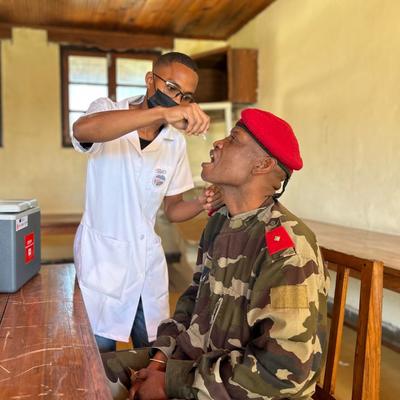
In 2023, Madagascar expanded its polio vaccination efforts to adults, targeting four high-risk regions: Vakinankaratra, Alaotra Mangoro, Analamanga, and Atsimo Andrefana. Using tailored Social and Behavior Change (SBC) strategies, the campaigns overcame vaccine hesitancy and logistical challenges by engaging workplaces, faith-based institutions, and public spaces. Symbolic leadership, high-level advocacy, and regional coordination ensured 97% vaccination coverage in some regions, showcasing the power of innovative SBC approaches to protect vulnerable populations.
Between 2023 and 2024, Madagascar embarked on an ambitious mission to vaccinate adults against the type 1 variant poliovirus in four high-risk regions: Vakinankaratra, Alaotra Mangoro, Analamanga, and Atsimo Andrefana. Traditionally, polio immunization efforts focused on children, but the pressing need to halt the virus's spread prompted the Ministry of Public Health (MPH) to extend the campaign to adults. Despite no official outbreak declaration, this proactive approach highlighted the effectiveness of innovative Social and Behavior Change (SBC) strategies in public health initiatives.
Challenges
Targeting adults for polio vaccination introduced unique challenges:
- Unfamiliarity with Adult Vaccination: Many adults had never received a polio vaccine and were unaware of its importance for their age group.
- Scheduling Conflicts: Vaccination activities were planned during weekdays when most adults were at work, attending religious services, or engaged in public events.
- Vaccine Hesitancy: Skepticism and reluctance among adults required dedicated efforts to build trust and encourage participation.
Strategic SBC Interventions
To address these obstacles, the MPH implemented a series of tailored SBC strategies:
1. Customized Communication and Mobilization
- Official Announcements: Sent to regional health officials, government ministries, and embassies to foster collaboration and widen outreach.
- Adult-Specific Messaging: Created targeted informational materials for adults, differentiating them from child-focused campaigns.
2. Workplace Collaboration
- Engagement with Business Leaders: Held advocacy meetings with the Malagasy Business Group (GEM) to facilitate on-site vaccinations.
- Information Dissemination: GEM shared campaign details with its members, leading to company-organized vaccination sessions supported by health teams.
3. Partnerships with Faith and Community Leaders
- Institution Mapping: Identified key locations such as churches, mosques, and community centers for vaccination drives.
- Advocacy Meetings: Engaged religious figures and local authorities to promote vaccination within their communities.
4. United Nations Support
- Internal Campaigns: The UN Resident Coordinator encouraged UN agencies to vaccinate staff and families, hosting sessions at UN facilities.
5. Leadership by Example
- Public Vaccinations: High-ranking officials, including governors and prefects, received vaccines publicly to inspire confidence.
6. Efficient Coordination
- Call Centers: Established regional centers to schedule and coordinate vaccination sessions across various venues.
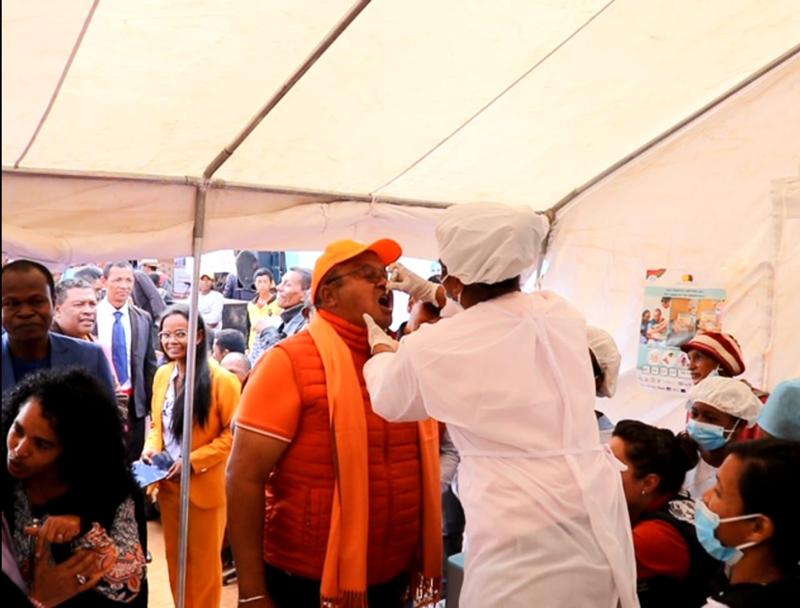
Photo: Governor of Analamanga receiving vaccination during the campaign launch. All Rights Reserved.
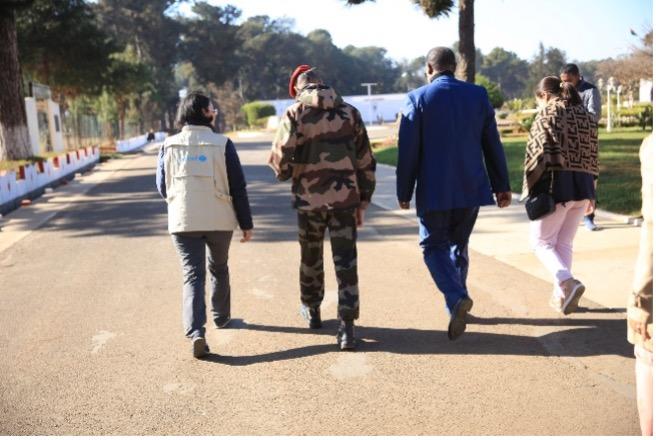
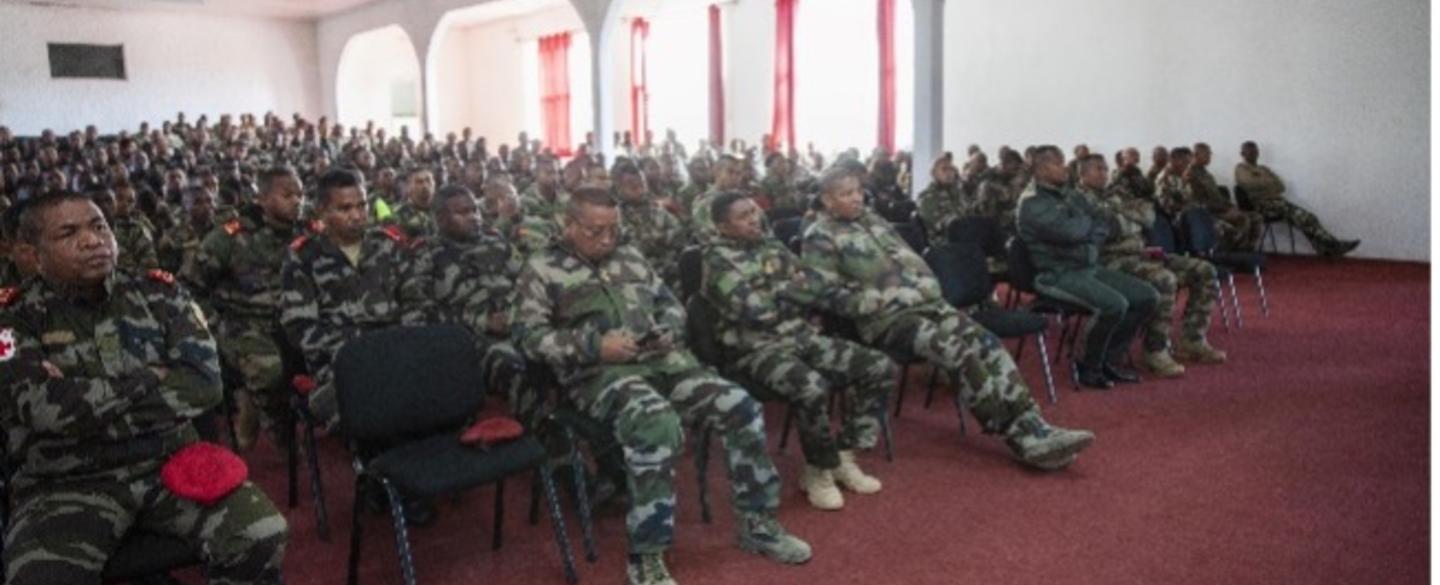
Photos: General Pikulas attending an information session for military academy students in Antsirabe. UNICEF/2023/Razafindralambo Hery Nirina.
Special Initiatives:
- Utilized the Indian Ocean Island Games in Antananarivo to vaccinate attendees, following advocacy with event organizers.
- Implemented a "desk-to-desk" approach to reach individuals hesitant to participate.
Outcomes
The campaign's strategic approach led to significant achievements:
High Vaccination Rates:
- Atsimo Andrefana: Achieved a 97% vaccination rate in rounds two and three.
- Analamanga: Increased from 88% in round two to 95% in round three.
- Alaotra Mangoro: Rose from 90% to 95% between rounds.
- Vakinankaratra: Improved from 94% to 95% over the same period.
Effective Use of Venues:
- Vaccinations were successfully administered in workplaces, religious institutions, and public areas.
- Companies like Orange Telecom hosted on-site vaccination events.
Lessons Learned
The campaign provided valuable insights:
1. Urban Resistance: Adults in urban areas with good sanitation often felt less at risk and were more resistant to vaccination.
2. Advocacy is Crucial: High-level support from MPH leaders was essential in uniting various sectors and ensuring campaign success.
3. Influence of Role Models: Public vaccinations by respected figures helped alleviate fears and motivated others to follow suit.
4. Reaching Private Enterprises: Engaging businesses outside the GEM network was challenging, indicating a need for broader outreach strategies.
5. Data Collection: A lack of detailed data on vaccination locations hindered in-depth analysis of the campaign's reach and effectiveness.
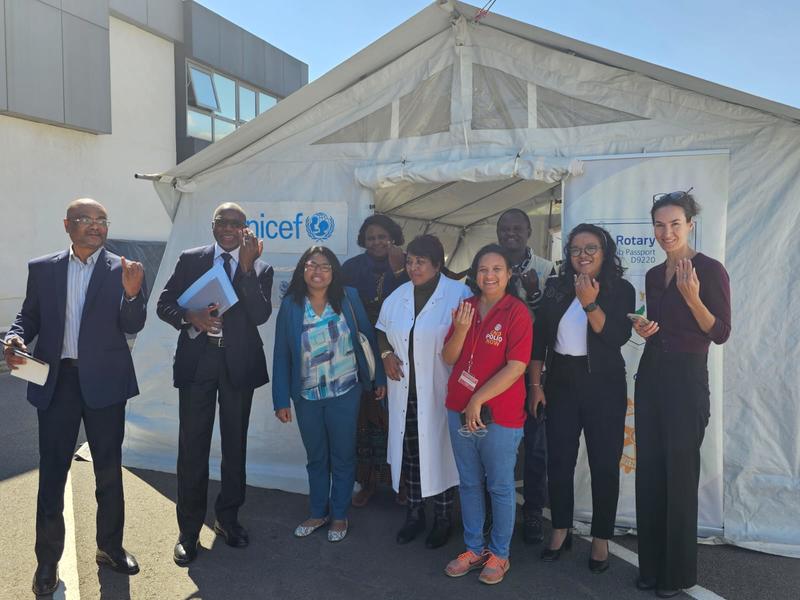
Photo: The UN Resident Coordinator at the time and agency heads shortly after their vaccination at the vaccination center located in the UN House in Antananarivo. UNICEF/2023/Rimoyal Ratnan
Madagascar's adult polio vaccination campaign serves as a powerful example of how tailored SBC strategies can overcome barriers and achieve public health goals. By directly addressing vaccine hesitancy, fostering strategic partnerships, and demonstrating leadership, the campaign not only protected vulnerable populations but also set a precedent for future initiatives targeting adults.
Written by HABA Koioro Seny Charlotte, STOP Consultant for Data Management and SBC, UNICEF Madagascar
Edited by Daria Shubina, UNICEF NY HQ Polio SBC Knowledge Management Specialist

